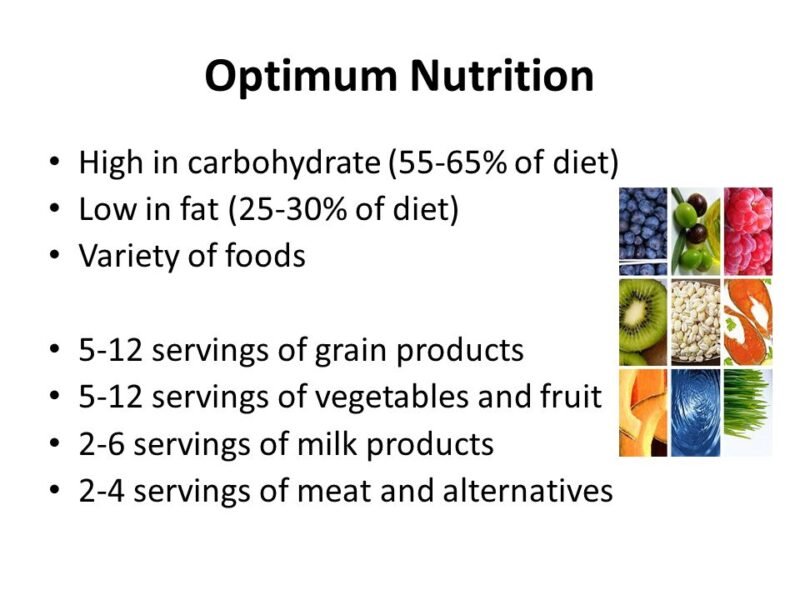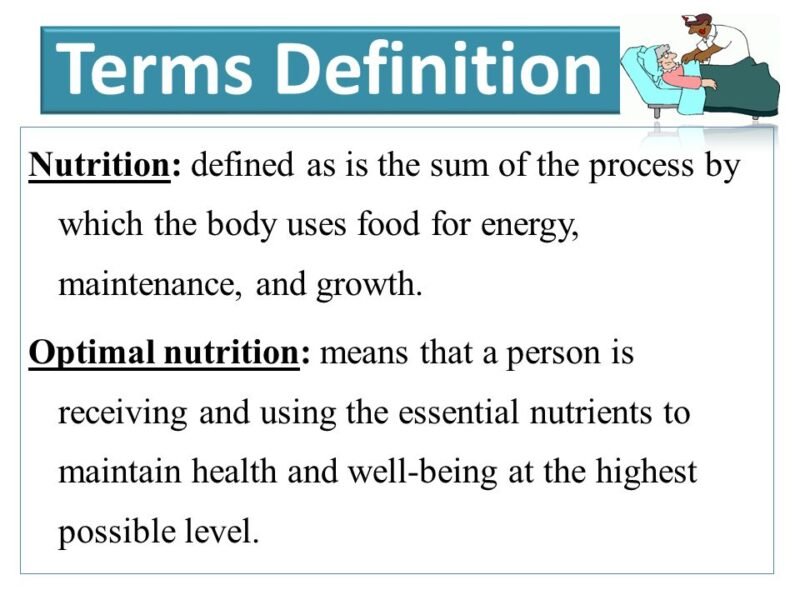What is Optimal Nutrition? What is Optimal Health? The Connection Between Nutrition and Health (2023)
Optimal nutrition is not just about eating to satisfy your hunger; it’s about providing your body with the essential nutrients it needs to function at its best. This article will explore the concept of optimal nutrition, its significance, and how you can achieve it.

Defining Optimal Nutrition
Optimal nutrition can be defined as the intake of the right amount of nutrients that your body needs to maintain good health. It involves a well-balanced diet that provides the necessary macronutrients and micronutrients.
Importance of Optimal Nutrition
Optimal nutrition is crucial for several reasons:
- It supports overall health and well-being.
- It helps prevent chronic diseases.
- It aids in growth and development, especially in children and adolescents.
- It boosts energy levels and cognitive function.

Components of a Balanced Diet
Macronutrients
Macronutrients are nutrients required in large quantities, and they include carbohydrates, proteins, and fats.
Carbohydrates
Carbohydrates are the body’s primary source of energy. They should make up a significant portion of your daily caloric intake.
Proteins
Proteins are essential for the repair and growth of body tissues. They also play a role in enzyme production and immune function.
Fats
Fats are necessary for the absorption of fat-soluble vitamins and provide a long-lasting source of energy. However, they should be consumed in moderation.
Micronutrients
Micronutrients are required in smaller quantities, and they include vitamins and minerals.
Vitamins
Vitamins are essential for various bodily functions, from maintaining healthy skin to supporting the immune system.
Minerals
Minerals, such as calcium and iron, are vital for bone health and oxygen transport in the blood.
Caloric Intake and Optimal Nutrition
Balancing your caloric intake with your energy expenditure is crucial to maintaining a healthy weight and optimal nutrition.
Balancing Macronutrients
A balanced diet includes an appropriate ratio of carbohydrates, proteins, and fats. The ideal proportion varies depending on individual needs and goals.
The Role of Fiber
Fiber is a type of carbohydrate that is not digested by the body. It aids in digestion and helps control blood sugar levels.
Hydration for Optimal Nutrition
Proper hydration is often overlooked but is a vital component of optimal nutrition. Water is essential for various bodily functions.
Optimal Nutrition for Different Life Stages
Optimal nutrition requirements change throughout life.
Children and Adolescents
During these stages, nutrition is critical for growth and development. A balanced diet is crucial for building a strong foundation for a healthy future.
Adults
Adults should focus on maintaining a balanced diet to support overall health and prevent chronic diseases.
Older Adults
Nutritional needs change with age, and older adults should pay attention to specific nutrients like calcium and vitamin B12.
The Connection Between Nutrition and Health
Optimal nutrition is closely linked to good health. It can prevent conditions like obesity, diabetes, and heart disease.
Optimal Nutrition vs. Dieting
Optimal nutrition is not about strict diets but about making long-term, sustainable choices for a healthier life.
Creating a Balanced Diet Plan
A registered dietitian can help you create a personalized diet plan based on your individual needs and goals.
Barriers to Achieving Optimal Nutrition
Various factors, including lifestyle, access to healthy food, and food preferences, can present barriers to optimal nutrition.
Practical Tips for Improving Nutrition
- Plan your meals and snacks.
- Choose whole, unprocessed foods.
- Control portion sizes.
- Be mindful of your eating habits.
What is Optimal Health?
Optimal health refers to a state of well-being in which an individual’s physical, mental, and social aspects are in their best possible condition. It encompasses a holistic approach to health, focusing on various factors that contribute to overall wellness. Here’s a breakdown of the key components of optimal health:
- Physical Health: Optimal physical health means that the body is functioning at its peak. This includes factors such as:
- Healthy Body Weight: Maintaining a weight that is appropriate for one’s age, height, and body type.
- Regular Exercise: Engaging in physical activity to improve cardiovascular health, strength, and endurance.
- Balanced Nutrition: Consuming a well-rounded diet with essential nutrients, vitamins, and minerals.
- Adequate Rest: Getting sufficient, quality sleep to allow the body to recover and rejuvenate.
Mental and Emotional Health:
Achieving optimal health involves having a positive and resilient mental state, which includes:
- Emotional Well-being: Managing and understanding emotions effectively.
- Stress Management: Coping with stress in a healthy way.
- Mental Clarity: Maintaining a sharp mind and cognitive function.
- Healthy Relationships: Nurturing positive connections with others.
Social Well-being:
Optimal health extends beyond the individual and considers one’s social environment. It includes:
- Strong Support Systems: Having a network of friends and family for emotional and practical support.
- Community Engagement: Being an active member of a community or social groups.
- Cultural and Spiritual Connection: Finding meaning and purpose through cultural or spiritual practices.
Preventative Measures:
Optimal health also involves taking steps to prevent illness and disease. This includes:
- Regular Check-ups: Visiting healthcare professionals for routine health assessments.
- Vaccinations: Staying up to date with vaccinations to prevent infectious diseases.
- Health Education: Continuously learning about health issues and making informed decisions.
Environmental Considerations:
Recognizing that the environment plays a role in health, optimal health includes:
- Clean and Safe Environment: Living and working in environments free from pollutants and hazards.
- Access to Healthy Resources: Having access to clean water, nutritious food, and healthcare.
Life Satisfaction:
Achieving optimal health also means living a life that is fulfilling and purposeful. This involves:
- Pursuing Passions: Engaging in activities that bring joy and purpose.
- Setting and Achieving Goals: Striving for personal and professional accomplishments.
- Resilience: Overcoming adversity and adapting positively to life’s challenges.
Optimal health is a dynamic and ongoing process. It requires continuous effort, self-awareness, and adaptation to life’s changing circumstances. It’s not about perfection but about striving for the best possible state of physical, mental, and social well-being to lead a fulfilling and meaningful life.
Title: “Unlocking Optimal Health: What It Means and How to Achieve It”
In the quest for a fulfilling life, we often ponder questions like, “What is optimal health?” and “How do we attain it?” Optimal health is the cornerstone of well-being and acts as a valuable resource in our lives. In this article, we will explore the meaning of optimal health, discuss the significance of optimal nutrition, and provide tips on how to achieve it.
What Is Optimal Health?
Optimal health is the gold standard for well-being. It encompasses a state where one’s physical, mental, and social facets are at their prime. Achieving optimal health means that we are functioning at our best in all aspects of life. But what does optimal health look like, and how can we define it?
What Does Optimal Health Mean?
Optimal health means that you are in a state of peak well-being. It’s characterized by:
- A healthy body weight and physique that suits your age and body type.
- Regular exercise enhances cardiovascular health and endurance.
- A balanced nutrition plan that provides essential nutrients.
- Sufficient, quality rest to allow your body to recover.
What Does Optimal Health Look Like?
Optimal health appears as:
- Emotional stability and effective management of stress.
- Mental clarity and sharp cognitive function.
- Maintaining positive and healthy relationships.
- Actively engaging in your community or social groups.
- Finding meaning and purpose through cultural or spiritual practices.
Optimal Nutrition and Its Role
Optimal nutrition is a pivotal component of optimal health. It’s about providing your body with the right nutrients to function at its best. To unlock the benefits of optimal nutrition, it’s essential to understand its significance.
Significance of Optimal Nutrition
Optimal nutrition is crucial because:
- It supports overall well-being.
- Helps prevent chronic diseases.
- Aids growth and development, especially in children and adolescents.
- Boosts energy levels and cognitive function.
How to Achieve Optimal Health?
Now that we’ve answered the question, “What is optimal health?” and highlighted the importance of optimal nutrition, let’s explore how to reach this state of well-being.
Tips for Achieving Optimal Health
- Balanced Diet: Consume a variety of whole, unprocessed foods for balanced nutrition.
- Regular Exercise: Engage in physical activity that suits your preferences and goals.
- Stress Management: Learn effective stress-coping techniques, such as mindfulness and relaxation exercises.
- Healthy Relationships: Foster positive connections with friends and family.
- Community Engagement: Participate in social activities and give back to your community.
- Cultural and Spiritual Connection: Explore practices that resonate with your beliefs and values.
- Regular Check-ups: Visit healthcare professionals for routine health assessments.
- Vaccinations: Stay up to date with vaccinations to prevent infectious diseases.
- Health Education: Continuously learn about health issues to make informed decisions.
By adhering to these tips and focusing on achieving a balanced and healthy lifestyle, you can work towards optimal health and well-being.
In conclusion, optimal health is more than just a goal; it’s a way of life that encompasses physical, mental, and social well-being. Understanding the significance of optimal nutrition and following the tips for achieving optimal health can lead to a life filled with vitality, purpose, and fulfillment.
Optimal Circadian Health Reviews
While we have delved into the questions of “What is optimal health?” and “How to achieve it,” it’s also essential to explore another dimension of well-being – circadian health. Our circadian rhythms, often referred to as our body’s internal clock, play a pivotal role in maintaining optimal health.
How Optimal Circadian Health Reviews Contribute
Understanding and optimizing your circadian health is crucial for your overall well-being. Here’s how it contributes:
- Regulated Sleep: A well-aligned circadian rhythm can promote restorative sleep, which is vital for physical and mental health.
- Hormonal Balance: The circadian clock helps regulate hormone production, affecting mood, energy levels, and various bodily functions.
- Immune Function: A synchronized circadian rhythm supports a robust immune system, reducing susceptibility to illnesses.
- Digestive Health: Eating in sync with your body’s clock can improve digestion and nutrient absorption.
- Energy Levels: A balanced circadian rhythm enhances your energy throughout the day, keeping you alert and focused.
- Mental Clarity: Cognitive function and mental well-being are closely tied to a well-functioning internal clock.
How to Optimize Circadian Health
Achieving optimal circadian health is intertwined with achieving overall health and well-being. Here are some practical steps to align your internal clock:
- Maintain a Regular Sleep Schedule: Try to go to bed and wake up at the same time every day to regulate your body’s internal clock.
- Exposure to Natural Light: Spend time outdoors during daylight hours to reinforce your circadian rhythms.
- Limit Exposure to Artificial Light: Reduce exposure to screens and bright artificial light, especially before bedtime.
- Balanced Nutrition: Eat your meals in alignment with your body’s natural rhythm, with a lighter dinner and avoiding heavy meals close to bedtime.
- Regular Exercise: Engage in physical activity, but avoid strenuous workouts close to bedtime.
- Stress Management: Learn stress-coping strategies like meditation and deep breathing to manage daily stressors effectively.
- Consistency: The key to circadian health is maintaining a consistent schedule in your daily routines.
- Seek Professional Guidance: If you have persistent sleep or circadian rhythm issues, consult a healthcare professional or sleep specialist for guidance.
Incorporating these practices can help optimize your circadian health and, in turn, contribute to your overall well-being.
How Much Does Optimal Health Program Cost?
As you embark on the journey towards optimal health, it’s natural to wonder about the cost associated with it. The expenses can vary widely based on individual needs, goals, and choices. Here’s an overview of what to consider:
- Healthcare Costs: Routine check-ups, medical assessments, and consultations with healthcare professionals are necessary components of optimal health. The cost depends on your insurance coverage, if applicable.
- Nutrition: Purchasing nutritious foods can be affordable if you plan your meals and shop wisely. It can also be costlier if you opt for organic or specialty items.
- Fitness: The cost of fitness activities can range from free outdoor exercises to gym memberships and personal trainers. Choose options that align with your budget and preferences.
- Stress Management: Stress management techniques like meditation and yoga can be cost-effective or even free if done at home. Classes and retreats may incur expenses.
- Community Engagement: Participating in community activities often requires little to no cost and can be a valuable part of your well-being journey.
- Mental Health Support: If you require counseling or therapy, the cost may vary depending on your healthcare coverage and the provider.
Ultimately, the cost of your optimal health program is a personalized matter. It’s essential to make choices that align with your financial resources and prioritize what matters most to you.
In Conclusion
Achieving optimal health is a lifelong endeavor. It’s a state of well-being that integrates physical, mental, social, and circadian health. Understanding what optimal health is, the significance of optimal nutrition, and the role of circadian health reviews is the first step. By following practical tips and making informed decisions, you can work toward living a life filled with vitality, purpose, and fulfillment. Your journey to optimal health is a unique path, but the rewards in terms of quality of life are immeasurable.
Optimal nutrition is a cornerstone of good health and well-being. By understanding the components of a balanced diet and making informed choices, you can support your long-term health goals and live your best life.
FAQs
What is the significance of optimal nutrition?
Optimal nutrition is essential for overall health, preventing chronic diseases, and maintaining energy levels.
How can I balance macronutrients in my diet?
The ideal macronutrient ratio varies, but a balanced diet typically includes a mix of carbohydrates, proteins, and healthy fats.
Why is hydration important for optimal nutrition?
Proper hydration is essential for various bodily functions and overall health.
Is dieting the same as achieving optimal nutrition?
No, optimal nutrition focuses on making sustainable, healthy choices, while dieting often involves restrictive, short-term plans.
How can I overcome barriers to achieving optimal nutrition?
Identifying your barriers and seeking support from a registered dietitian can help you overcome obstacles and improve your nutrition.
https://optimalhealth.in/health/
https://www.cminj.com/blog/7-key-health-benefits-of-getting-optimal-nutrition




